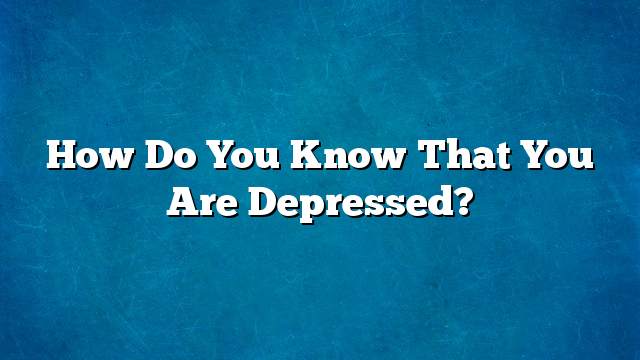Depression
Depression is a common disease around the world. It is different from the erratic or bad mood sometimes experienced by some. It can become a serious condition that prevents the individual from exercising his or her normal life. He has difficulty performing his duties and integration in the family and at work. The end may lead to suicide, the second leading cause of death for people between the ages of 15 and 29, according to the World Health Organization.
Definition of depression
Depression is a continuous state of sadness, apathy and other symptoms that persist for a period of at least two weeks. The condition of the individual is so bad that he or she ceases to practice his or her daily routine. Depression does not indicate weakness or an individual’s personality is negative, but a treatable health problem.
Who are at risk of depression
However, many experts tend to believe that genes and genetic factors play a larger role in depression, as a parent or sibling is more likely to develop depression, and studies suggest that women are more likely to develop depression. The ratio of her man show.
Factors that increase the likelihood of depression
There are a number of reasons that can increase the chance of depression, including:
- The presence of first-degree relatives suffering from depression, addiction or suicide.
- Certain personality traits, such as being pessimistic, suffer from low self-esteem and constant self-criticism.
- Other problems or psychological conditions, such as anxiety, or post-traumatic stress disorder.
- Addiction to alcohol or drugs.
- Exposure to shocks, stress or traumatic events, such as loss of a close associate or difficult relationship.
- Exposure to psychological trauma or depression in childhood or adolescence.
- Exposure to chronic or serious diseases such as heart disease or cancer.
- Some medications may cause side effects such as depression, which should not be stopped unless you consult a specialist.
Types of depression
There are several types of depression related to certain conditions, such as environmental conditions or age, and these types:
- Seasonal depression: Or “seasonal emotional disorders”, which is a type of seasonal depression, which occurs in the form of grief usually begins in late autumn and early winter, and end in the spring and summer, and this grief affects all people by 3% to 20% Depending on the nature of the place where the person lives.
- Postpartum depression: It is a type of depression, which affects about 12% of mothers, where their mood worsens and show symptoms of severe depression, but additional teams, this depression may endanger the child’s existence, it is difficult for the mother to communicate with her child and to establish links with him or take care of him.
- Mono or bipolar depression: Unipolar disorder is a recurrence of uninhibited depression. Bipolar disorder is the feeling of depression, mania and mixed moods.
- Retarded Depression: It is a depression that afflicts the elderly, characterized by a delusional illness, constant irritability, and has special causes and individual development.
Symptoms of depression
An individual is diagnosed with depression if he / she has five of the following symptoms:
- The feeling of deep sadness most of the time and almost every day, and show the person the features of crying, or as if he wants to cry, Depressed does not feel the taste of life, not happiness or joy or anything beautiful.
- An imbalance in weight, a person loses weight and loses his appetite or earns a lot of weight relatively short.
- The indifference and indifference of the person to what is happening around him, the results of his actions or his responsibilities, and the slow movement, speech and reactions on a daily basis.
- The person’s lack of feeling of life, or the desire to practice his hobbies that he loved, but on the contrary wants isolation and unity.
- Loss of concentration in everyday business is simple, the person becomes forgetful, unable to think, or make sound decisions almost daily.
- Feelings of self-confidence and guilt almost daily.
- Lack of sleep, insomnia, inability to get enough sleep without frequent waking, or sleeping for too long, for longer periods, and not being able to wake up for long periods of the day, tries to evade reality and negative feelings.
- A lot of thinking about death, and in advanced cases may dominate the thinking of suicidal suicidal.
- Physical fatigue, loss of energy, and inability to do any simple things, such as changing clothes, work is harder than it actually is, and it takes a person longer to complete.
Complications of depression
There are a number of complications that are associated with depression, and exposed to the patient if not received the necessary treatment, including:
- Addiction to alcohol abuse.
- Self-harm.
- Physical pain and illness.
- Obesity problems that may lead to diabetes.
- Family conflicts and problems in social relations.
- Social isolation and social phobia.
Treatment of depression
There are several ways to treat depression, such as the use of antidepressant and antidepressant therapy, but the treatment of these drugs is only effective for half of the patients, apart from the side effects of these drugs, in addition to it may cause addiction, and does not help to solve the main problem that caused depression To improve the feeling only, which made many of the patients stop using, but it is effective if accompanied by medication therapy by talking to a specialist and undergo cognitive behavioral therapy, and the use of a healthy lifestyle and exercise to improve mood and Psychological condition.
